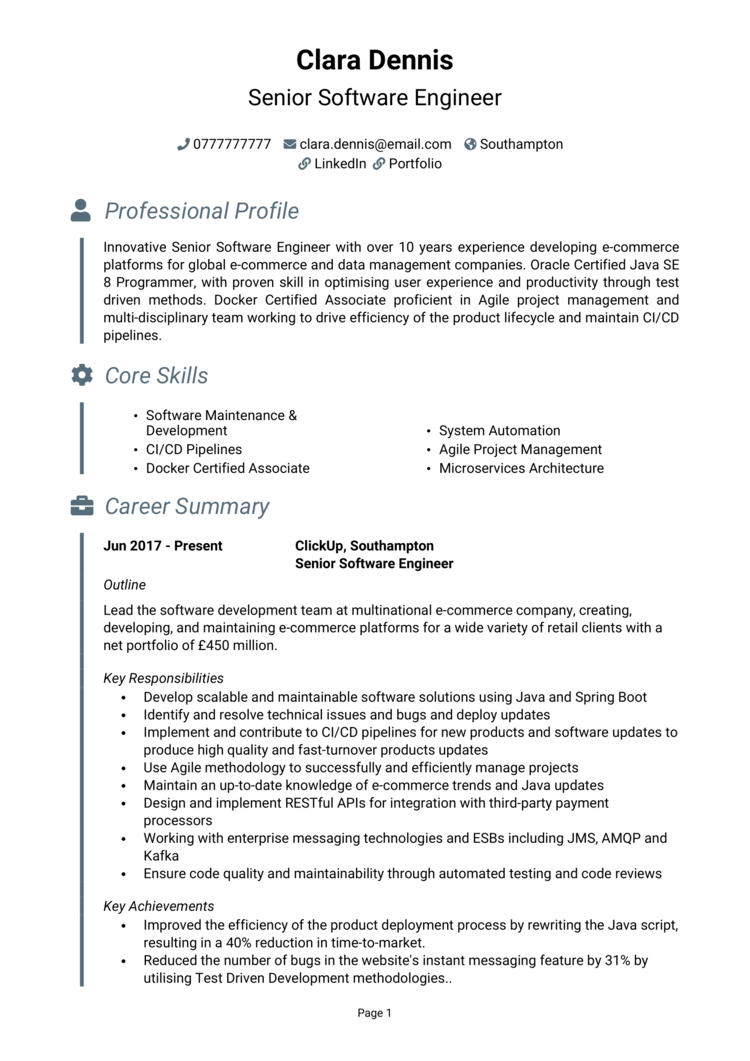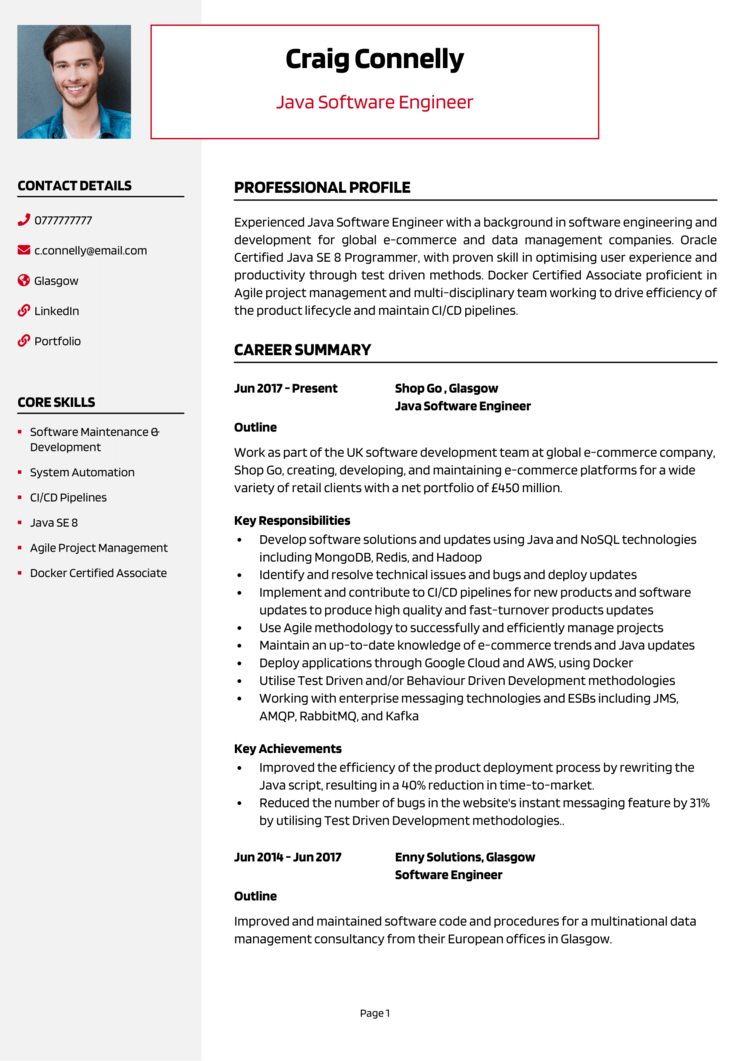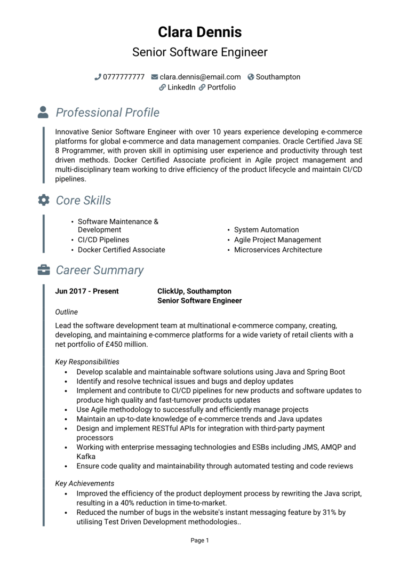Do you have the code to crack your next career move? Think of your CV as your program’s first run – if it’s riddled with errors, the recruiter won’t stick around to fix the bugs.
But before you can debug someone else’s system, you need to debug your own application process. That starts with a CV which convinces recruiters you’re the candidate they need.
This guide, packed with Software Engineer CV examples, will help you highlight your technical skills, coding expertise, and ability to build scalable solutions that get the job done.
Software Engineer CV

Google Software Engineer CV

Java Software Engineer CV

How to write your Software Engineer CV
Learn how to create your own interview-winning Software Engineer CV with this simple step-by-step guide.
A Software Engineer CV isn’t just about listing the programming languages you know – it’s your chance to demonstrate your problem-solving mindset and knack for writing clean, efficient code. Recruiters want to see a blend of technical skills, teamwork, and innovation.
This guide will walk you through how to craft a CV that showcases your technical expertise, demonstrates your achievements, and proves you’re ready to tackle any challenge thrown your way.
Structuring your Software Engineer CV


Your CV should be as structured and efficient as the code you write – no unnecessary loops or redundant sections. A clear layout ensures recruiters can quickly find the information they need.
Here’s how to structure your Software Engineer CV:
- Name and contact details – Display your contact details clearly at the top so employers can get in touch easily. Adding a photo is not compulsory.
- Profile – Open with a compelling overview of your engineering skills, experience, and career goals.
- Core skills – List your key abilities in this section, focusing on those that will be most relevant to the job, like coding knowledge.
- Work experience – Give a detailed breakdown of your work history, starting with the most recent job first.
- Education – Outline your education and certifications, focusing more detail on those most relevant to the role.
- Additional info – Use this optional space for relevant hobbies and interests or personal pursuits that enhance your application.
Software Engineer CV format


Your CV should be as polished and user-friendly as the apps and systems you develop. A disorganised CV is like spaghetti code – it’ll confuse recruiters faster than a poorly named variable, and these avoidable mistakes can cost the brightest candidates the role.
Here’s how to format your Software Engineer CV:
- Bullet points – These help recruiters skim through your accomplishments quickly and easily.
- Divide sections – Break your CV into distinct sections with clear headings for smooth navigation.
- Use a clean font – Use a simple, professional font and keep your layout uncluttered for maximum readability.
- Keep it the right length – Go for 2 pages at most – enough space to highlight your expertise while keeping the recruiter interested.
Software Engineer CV profile


Your profile is the opening line of code that sets the tone for the rest of your CV. Go over the skills and experience that make you the ideal candidate for the role.
Software Engineer CV profile examples
Profile 1
Proficient Software Engineer with five years of experience in full-stack development, specialising in designing scalable web applications. Skilled in JavaScript, React, Node.js, and SQL, with a strong focus on writing clean and efficient code.
Profile 2
Organised Software Engineer with three years of experience in backend development for fintech companies, adept at creating secure APIs and optimising database performance. Proficient in Python, Django, and PostgreSQL, with a solid understanding of data structures and algorithms.
Profile 3
Experienced Software Engineer with over eight years of expertise in enterprise software solutions, focusing on cloud-based architectures and microservices. Skilled in Java, Kubernetes, and AWS, with a proven track record of delivering robust and efficient systems.
What to include in your Software Engineer CV profile
Here are some tips on what to include in your Software Engineer CV profile:
- Where you’ve worked – Mention which sort of companies or industries you’ve developed software for.
- Your top qualifications – Highlight degrees in computer science or certifications like AWS Certified Developer.
- Key skills – Note specific, important abilities like full-stack development, API integration, or cloud computing.
- Projects you’ve completed – Reference notable software projects or systems you’ve worked on.
- Programming languages – Whether you’re an expert with JavaScript or C#, tell the recruiter: this is valuable information for the role you’re going for.
- Types of systems worked with – An engineer’s skillset will vary from system to system, so name the specific systems you have implemented.
- Stakeholders you’ve collaborated with – Mention teams, clients, or users you’ve worked with to deliver results.
Core skills section


Your core skills section is like your GitHub repository – it shows off your best projects at a glance, letting recruiters see exactly what tools and technologies you bring to the table.
For Software Engineers, this section should highlight coding expertise, system design skills, and problem-solving abilities. Tailor it to the specific role and industry you’re applying for.
Need help writing a software engineer CV that showcases your technical skills?
Essential skills that recruiters look for in a Software Engineer CV
- Programming Languages – Proficient in Python, Java, JavaScript, and C++.
- Web Development – Expertise in HTML, CSS, and React for creating responsive, user-friendly interfaces.
- Database Management – Skilled in SQL, MongoDB, and PostgreSQL for data storage and retrieval.
- Cloud Computing – Experience with AWS, Azure, or Google Cloud for scalable deployments.
- API Development – Designing and implementing RESTful APIs for seamless integration.
- Agile Methodologies – Familiarity with Scrum and Kanban for efficient project management.
- DevOps Tools – Using Docker, Kubernetes, and Jenkins for streamlined CI/CD processes.
- Version Control – Proficient in Git and GitHub for collaborative development.
- Debugging and Testing – Identifying and resolving issues with tools like Selenium and JUnit.
- System Design – Creating scalable and maintainable architecture for software applications.
How to present past roles for Software Engineers


Your work experience section should prove you’re more than just someone who can browse Stack Overflow for solutions.
Highlight your real-world impact: the practical application of your coding skills and problem-solving abilities. Describe your contributions to projects, the systems you’ve designed, and the results you’ve achieved.
List your roles in reverse chronological order, focusing on responsibilities and measurable outcomes.
The best way to structure job entries on your CV

- Outline – Provide an overview of the company, your role, and the types of software or systems you developed.
- Responsibilities – Highlight tasks like coding, debugging, or collaborating with cross-functional teams. Use action verbs like “developed,” “implemented,” or “optimised.”
- Achievements – Showcase measurable results, such as reduced system downtime or increased user engagement. Include figures wherever possible to add impact.
Example jobs for Software Engineer
Software Engineer | Codecraft Innovations
Outline
Designed and implemented scalable web applications for a SaaS company, focusing on user experience and performance. Collaborated with cross-functional teams to deliver high-quality products.
Responsibilities
- Developed and maintained front-end features using React and Redux.
- Implemented RESTful APIs and backend services with Node.js and Express.
- Optimised database queries in SQL to improve application performance.
- Conducted code reviews to ensure adherence to best practices and coding standards.
- Collaborated with designers and QA teams to enhance application functionality.
Achievements
- Reduced page load times by 30 percent through front-end optimisation.
- Delivered three major product updates ahead of schedule, improving client satisfaction.
- Recognised by management for building reusable components that reduced development time.
Software Engineer | FinEdge Systems
Outline
Built and maintained secure backend systems for a fintech company, ensuring data integrity and system reliability. Focused on delivering robust solutions for payment processing and account management.
Responsibilities
- Developed APIs and microservices using Python and Django for real-time payment processing.
- Implemented encryption protocols to secure sensitive financial data.
- Optimised PostgreSQL databases to handle high transaction volumes.
- Worked with DevOps teams to deploy and monitor applications in a cloud environment.
- Provided technical documentation and support for integration with third-party systems.
Achievements
- Increased transaction handling capacity by 40 percent through database optimisation.
- Reduced system downtime by 25 percent with improved monitoring and alert systems.
- Successfully implemented a fraud detection system that reduced incidents by 15 percent.
Software Engineer | Enterprise Solutions Group
Outline
Designed and deployed cloud-based software systems for enterprise clients, focusing on scalability, reliability, and security. Delivered custom solutions that addressed client-specific challenges.
Responsibilities
- Developed microservices architecture using Java and Spring Boot.
- Deployed applications on AWS, leveraging services like EC2, S3, and RDS.
- Implemented CI/CD pipelines to automate testing and deployment processes.
- Performed unit and integration testing to ensure software reliability.
- Worked closely with stakeholders to gather requirements and deliver tailored solutions.
Achievements
- Reduced deployment times by 50 percent through automated CI/CD pipelines.
- Improved system scalability, supporting a 60 percent increase in user traffic.
- Recognised for delivering a complex enterprise solution six weeks ahead of deadline.
Education section


The education section is essential for Software Engineers, as it demonstrates the requisite knowledge and technical training, and underlines your impressive work history. Include degrees, certifications, and any relevant courses.
List your qualifications in reverse chronological order, starting with the most recent.
Most valuable qualifications for Software Engineers
- Bachelor’s Degree in Computer Science – Foundational knowledge of algorithms, programming, and system design.
- AWS Certified Developer – Expertise in developing scalable applications on AWS.
- Certified Kubernetes Administrator (CKA) – Proficiency in container orchestration and management.
- Microsoft Certified: Azure Solutions Architect – Training in designing cloud-based solutions.
- Oracle Certified Java Programmer – Validation of expertise in Java programming and application development.





